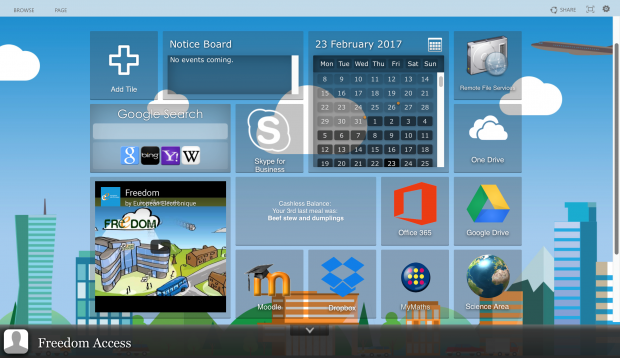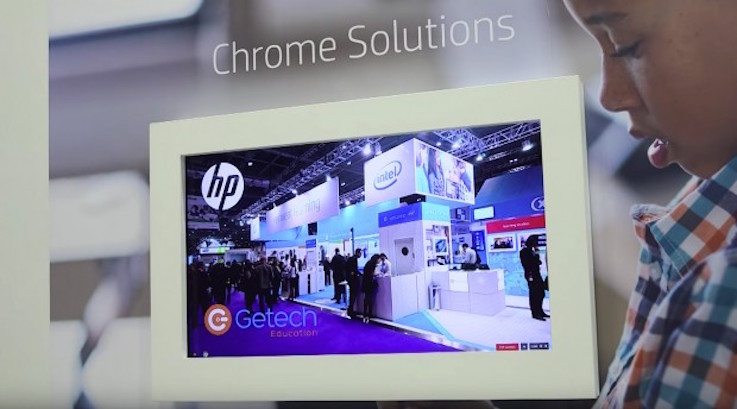European Electronique’s Freedom Cloud
Freedom Cloud helps schools move to a fully managed public or hybrid cloud with educational IT provision

Information technology for education is in a period of considerable change. Just a few years ago, the focus was on-premise hardware and infrastructure. However, the attention has now shifted to cloud-based solutions, and at the forefront of this shift is European Electronique.
Over 30 years of business, 25 of which have been serving the educational market, European Electronique has watched and driven change in information technology for education. The company began by supplying printing solutions and maintenance services to commercial organisations, but has now evolved into an IT solutions provider working across education, public and commercial sectors with a significant focus on the cloud.

This is where European Electronique can help. Freedom is one of the key technologies the company offers to aid educational institutions with the transition to the cloud. A complete suite of ICT services that is delivered from and managed within the cloud, the provision can be entirely public or a balance between this and on-premises servers, creating a hybrid solution. The latter maximises the access potential from public provisions alongside the performance available from local, on-premises hardware. In all cases, choice and reliability are maximised, while cost is minimised.
A game-changing feature of Freedom is its ability to scale the number of users supported from a single school to a multi-academy trust. Traditional IT is primarily a capital expense but Freedom can balance capital and revenue spending for a smoother, more predictable cost. The service costs can even be tailored to fit entirely into a revenue budget, avoiding the irregular large expense of a capital project.
Freedom is also a modular system, enabling school IT administrators to choose to implement a part of or all of the platform. For starters, it provides secure critical backup and restore. Since the services are implemented using device-agnostic web technologies, all that's required is network connectivity and a web-capable device. The two main components of Freedom are Freedom Access, for creating a learning platform, and Freedom Services, which is all about creating a virtual network along cloud principles.
This can either be entirely devoid of local servers, or some traditional local services can be retained and blended into a seamless provision, in the hybrid case. This can even be a dynamic configuration where local services are moved into the cloud as the current hardware reaches end of life. In other words, implementing Freedom Services doesn't have to be a jolt to the regular activities of learning; the cloud can be phased in gradually, replacing existing services in a stepped process.

From a user perspective, one browser interface provides access to everything. A single password sign-on allows the user to check their email, access a flexible array of educational apps, and print with a single click. A cashless catering system and virtual online library are also available. Management systems for administrators and public cloud services can be included, and the whole interface is user-configurable.
Instead of having to administer multiple physical servers, each one for a subset of users, a single Freedom Virtual Data Centre server puts all user data in one place in the cloud. The Freedom Connector optimises bandwidth depending on the connection method being used. The Freedom Backup ensures client, server and applications are secured in the cloud, with an optional local cache for faster recovery.
For administrators, Freedom View provides monitoring and management facilities. Client devices can be configured, and operating systems and updates deployed from the cloud. Reports can be created on clients, servers and network infrastructure to provide a holistic view of system conditions. The management facilities include control over mobile devices, wireless access points and web and content filtering, as well as email security.
Shifting educational IT services to the cloud is a true revolution that's happening right now. Huge financial savings are available, as are predictable, scalable costs. But the benefits are much more than just a smaller IT outlay with business otherwise as usual. Distributed collaboration is built in, and new facilities can easily be rolled out to a cohort of students with just a few clicks. The Freedom platform from European Electronique provides the flexibility and control required for schools to take maximum advantage of what the cloud revolution has to offer, at the pace of adoption that fits their needs.
For more information, visit www.euroele.com or call 08453 458 340.
Sign up today and you will receive a free copy of our Future Focus 2025 report - the leading guidance on AI, cybersecurity and other IT challenges as per 700+ senior executives
Dr James Morris has worked as a technology journalist for over 25 years, including spending nine years on the staff of market-leading computer magazine PC Pro, the last five of which were as the publication’s editor. He specialises in enterprise-grade software and hardware, with a particular focus on content creation. He launched a pioneering video channel for HEXUS.net in 2006 and ran the video reviews channel for TrustedReviews.com for four years. He also runs a successful online digital content and commercial video production company, t-zero communications Ltd.
Dr Morris is a prolific technology writer and contributes commercial content for major IT brands including AMD, BlackBerry, Dell, Cognizant, HP, and IBM. He published a book on artificial intelligence, Can Computers Create Art? in 2009. He is also an academic, and is currently Pathway Director of the MA, Interactive Journalism at City, University of London.
Previously, he was course leader for the BA in Web Media Production at Ravensbourne University. He has a PhD in Philosophy, Art and Social Thought from the European Graduate School in Switzerland, a Master's in Media Arts from the New School in New York, USA, and a Bachelor's in Social Anthropology from the London School of Economics.
Dr. Morris can be found on Twitter at @Cyberwest, or emailed at j@tzero.co.uk
-
 Trump's AI executive order could leave US in a 'regulatory vacuum'
Trump's AI executive order could leave US in a 'regulatory vacuum'News Citing a "patchwork of 50 different regulatory regimes" and "ideological bias", President Trump wants rules to be set at a federal level
-
 TPUs: Google's home advantage
TPUs: Google's home advantageITPro Podcast How does TPU v7 stack up against Nvidia's latest chips – and can Google scale AI using only its own supply?
-
 C-Learning puts the "cloud first" in education
C-Learning puts the "cloud first" in educationSponsored UK schools and colleges are only just entering the cloud revolution
-
 Getech Education helps schools move to the cloud
Getech Education helps schools move to the cloudSponsored Taking a school's classroom IT to the cloud needs careful consideration
-
 RM Buzz from RM Education
RM Buzz from RM EducationSponsored RM Buzz adds user-focused filtering on Chromebooks for students using RM Unify and G Suite for Education
-
 BETT 2017: don't drown schools in wave of ed tech
BETT 2017: don't drown schools in wave of ed techOpinion Finding the right tech in the flood of options isn't easy for schools
-
 How teachers brought Minecraft into classrooms
How teachers brought Minecraft into classroomsNews Microsoft and Minecraft reveal new teacher tools for using the game in schools
-
 HP: VR and two-in-ones are the future of ed tech
HP: VR and two-in-ones are the future of ed techAnalysis HP's head of education predicts the future of technology in classrooms
-
 Why fun tech is good for schools
Why fun tech is good for schoolsAnalysis Lego and Minecraft are sweeping education tech – but do they offer more benefit than making school fun?
-
 Simplifying tech for schools
Simplifying tech for schoolsAnalysis Chromebooks, Microsoft Intune and more are trying to make it easier for schools to buy and manage technology
